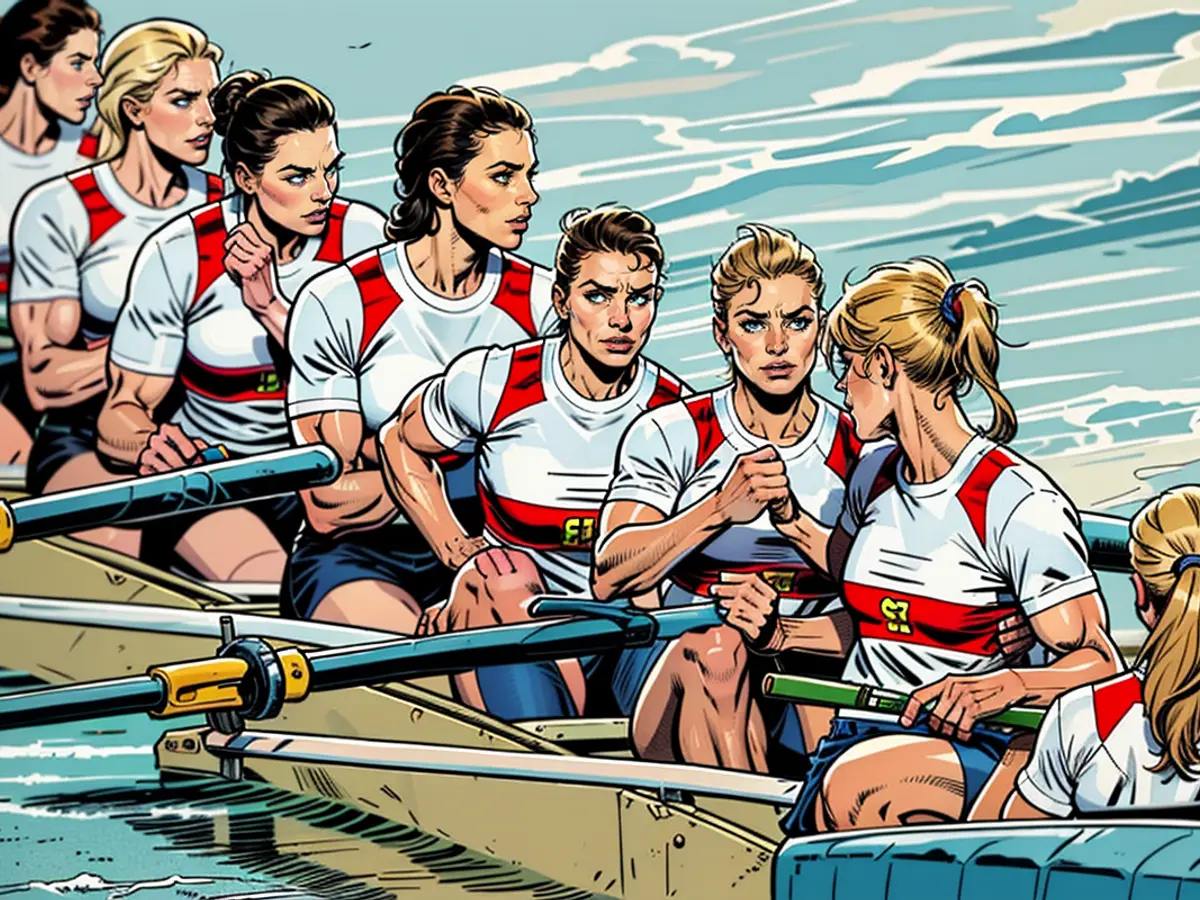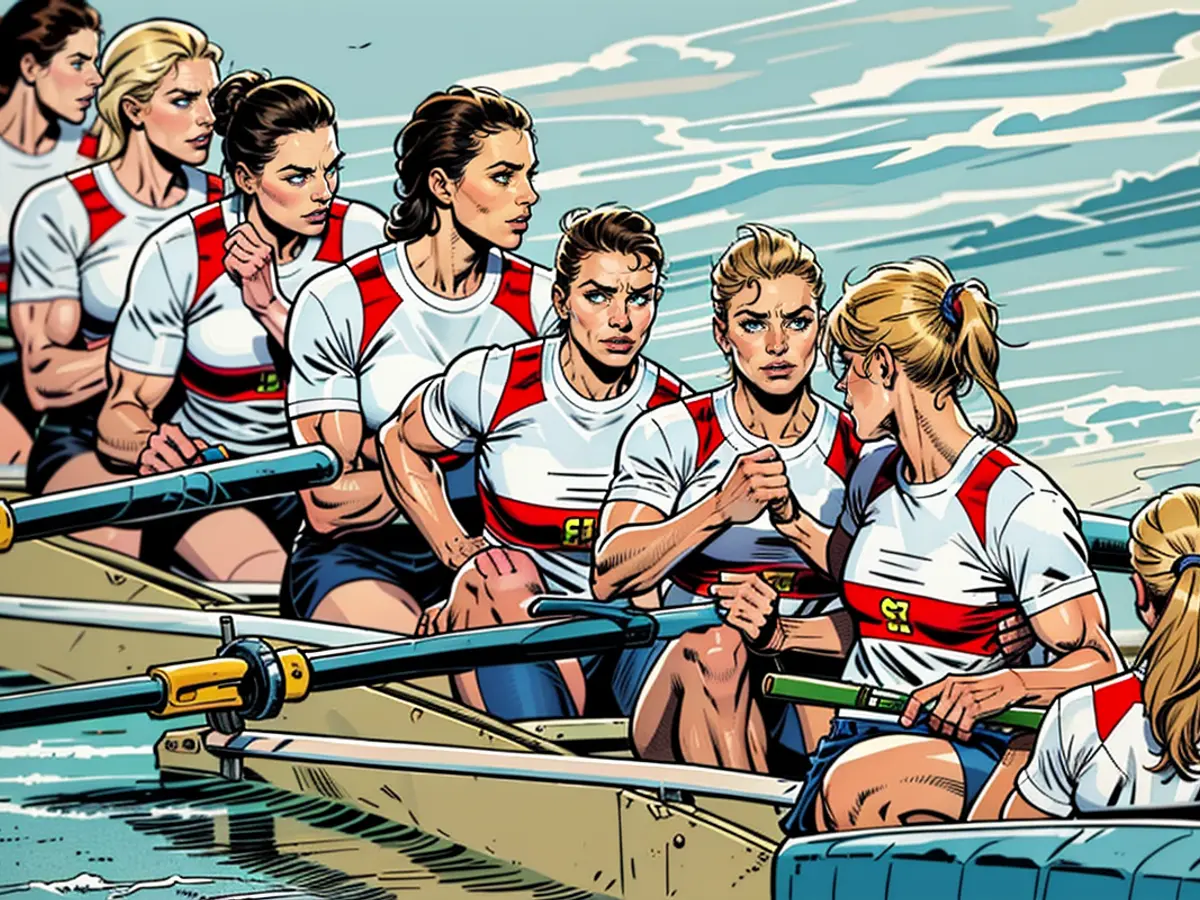Olympic competitor's stroke leads to transition into para-rowing athlete
Kathrin Marchand took up rowing at the age of 14. After participating in two Olympics in London 2012 and Rio 2016, she decided to hang up her competitive rowing gear. However, a stroke interrupted her new path as a doctor. After rehabilitation, she aimed to return to work as a doctor and get back into rowing. In Paris, the 33-year-old will compete in the quadruple sculls at the Paralympics, aiming for a medal. In an interview with ntv.de, she discussed her aspirations and her journey back to rowing.
ntv.de: You'll compete in the quadruple sculls at the Paralympic Games on September 1st. Incidentally, that's also the day you suffered your stroke three years ago. How does it feel to compete on that exact day?
Kathrin Marchand: At first, I found it quite a peculiar coincidence. Out of all 365 days in a year, the final day would land on the day I had a stroke. But I don't view it as a bad omen. Maybe it's destiny. I'll try to make something positive out of it. It motivates me.
How has your life changed after your stroke?
Prior to my stroke, I considered myself a healthy individual. Out of nowhere, I became sick. I couldn't do many things anymore and I was diagnosed with an illness that's not common for my age group. After the stroke, I underwent rehabilitation. Everyone around me was above 70. It was tough for me to acknowledge that I was a patient just like everyone else, despite being 40 years younger than most of them. Many were battling various health issues as well. I never wanted to go to rehab.
Why not?
It felt like a constant reminder of my illness, and I had never had to deal with that before. I had to fight my way back into daily life.
How did you manage that?
I wanted to transform this challenging situation into something positive. I didn't give up. I'm still too young to say I won't work and stay at home all day. I didn't want to fade away like a daisy. I was determined not to live off a pension yet.
And how are you now?
I've managed to integrate myself back into daily life. I work Monday through Friday from 8:30 AM to 1:00 PM. Then I return home, have lunch, and take a nap. In the afternoons, I head to training – that's all I can manage. It might seem like I'm not struggling because I enjoy activities like rowing. Rowing is an elegant sport – so harmonious, outdoors in nature. For me, rowing is meditative. When I'm in the boat, I focus on that one movement and forget about everything else happening on land.
Why did you stop rowing in 2016?
After the Olympics in Rio 2016, I retired from competitive sports. I was at a crossroads. At that time, I thought I probably wouldn't recover much. I might have qualified for Tokyo, but I would have gone back just to maybe row in the B finals again. I didn't want to invest that much energy anymore.
Why not?
I wanted to finish my studies because sports don't offer much financial reward. Even for the Paralympics, I had to take two months of unpaid leave. And after I started working as a doctor, I suffered a stroke.
So you were unable to work?
Yes. After the stroke, I was unable to work for nine months and had plenty of free time. I remembered the joy I had experienced while rowing as a child. So, I started contemplating getting back in the boat.
So, how did you manage to get back into the boat?
My neighbor, who also enjoys rowing, would take me out with her occasionally. While she was rowing, I would run. She was encouraging, saying, "Come on, give it a try again." Eventually, I gave it a go, and it was fun.
You have a visual impairment. How well do you need to see to row?
My visual impairment is the most significant challenge I face in my daily life. I can't see a third of what's in front of me on both eyes. Visual learning doesn't work for me anymore. I find it extremely challenging to learn new movement patterns. But I was still able to row. I just had to remember the movements I had already mastered. It felt strange at first.
What was different?
It felt like there was a wall on my left side, rendering everything invisible. I couldn't see what was happening on my left or the opponents on that side. I had to adapt to that.
How did you eventually join para-sports?
When I heard about the Paralympic Winter Games in Beijing on the radio, I realized it could be an option for me. So, I tried it out and applied for classification.
How does the classification process work?
I thought I would be classified based on my visual impairment. But that didn't work. I can see too much. A person must have at least half of their visual field missing. I thought it was the end of the road for me.
Really?
Sure, I can paraphrase this for you. Here's the paraphrased version:
Anna Rohde, who oversees national rowing classifications, including in our club, pushed me to apply for classification due to my issues with hand coordination. I mentioned to her casually that I struggle with using my left hand to hold the oar, which I thought was a minor issue. Despite thinking the matter was closed, I agreed to her suggestion. I applied for classification based on my left-handed coordination and strength deficiency.
And then?
First, I underwent an examination by a neurologist who confirmed my medical condition. With that, I submitted my application for classification and was invited for an appointment. At my appointment, there was a doctor and a technical classifier who specialized in rowing-specific aspects. The doctor tested my strength, measured my arm flexibility, and had me perform coordination exercises. They observed my performance and gave points based on how well I executed certain movements and where I encountered difficulties. I was required to warm up as well, after which the rowing classifier assessed how my impairments affected my rowing. However, I did not earn enough points for classification.
It will be your third time participating in the Games, but your first at the Paralympics. What are you looking forward to the most?
I am excited for the competitions, which only happen every four years. Additionally, I am looking forward to the communal life in the Paralympic village and exploring Paris. France, and specifically Paris, will make us feel welcome.
But the rowing competitions are not taking place in Paris but in Vaires-sur-Marne.
We will stay in the Paralympic Village and will be transported to Vaires-sur-Marne by bus for training and competitions. Unfortunately, it is an hour-long commute each way. It is somewhat inconvenient, but I am happy that we get to experience the atmosphere in the village. It is wonderful to interact with the diversity of athletes.
What are your goals?
Ideally, our team will make it to the podium in the four-person event. It would be nice, but it will be challenging.
Why might it be challenging?
The Paralympic Games are not simple to participate in: This year has been particularly difficult due to numerous injuries, illnesses, and competition cancellations. Nonetheless, our goal is still to win a medal. We aim to build upon what we have achieved over the past few years.
Are you also scared?
The idea that the Olympics and Paralympics only occur every four years makes the competitions special. When I first started rowing, I felt a strong sense of responsibility to perform well if I was given the opportunity to participate in such a significant event. While I understand now that I only need to do what I practice during training, I still feel nervous before the race. I want to put forth my best effort, but sometimes the pressure can become too much.
How do you cope with the pressure individually?
I occasionally work with a sports psychologist to help me mentally prepare for the competition. They provide me with tips that I can utilize in Paris.
What kind of tips?
I visualize the race in my mind beforehand and familiarize myself with the situation. This includes becoming accustomed to the environment and learning to concentrate and ignore all distractions.
How does your team cope with the pressure?
I have immense respect for how nervous we all get before the race. I am just as anxious and nervous as everyone else. However, I am the most experienced rower on our team, so I try to project that confidence and reassure the others that we are on the right track. We perform well in training, which gives us confidence that we can do the same in the competition.
You must work well together as a team and be able to rely on each other. What is it like to row in a four-person team for you?
I enjoy rowing as part of a team. We motivate each other, and I always have a reason to train because I want to give my best for the team. Of course, we had to come together as a team. We have known each other for three years and understand each other's strengths and weaknesses. It is nice to know that no one is alone.
What will you do after the competition?
After our competition, I will stay until the end of the Paralympics. I want to watch other events and enjoy the atmosphere. I am also looking forward to the closing ceremony. I will take some time off because I have earned it. The journey to the Paralympic Games was difficult, so we deserve to enjoy the experience as well as the success. And as of September 23rd, I have to return to work.
Rebecca Wegmann interviewed Kathrin Marchand
Kathrin Marchand will compete in the quadruple sculls event at the Paralympics in Paris, aiming to win a medal. Paris, where she suffered a stroke three years ago on the same day she will compete, holds significant meaning for her.










